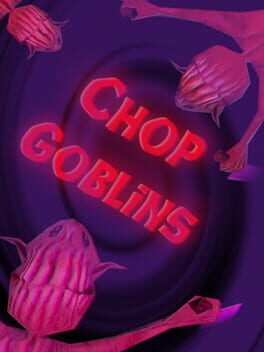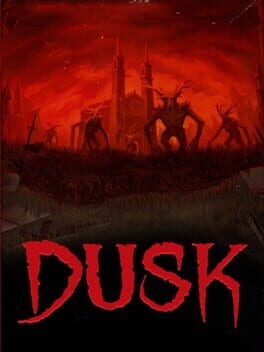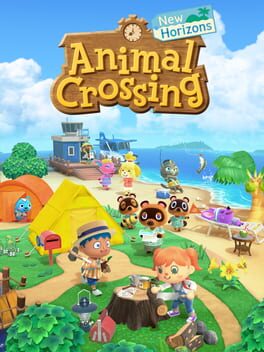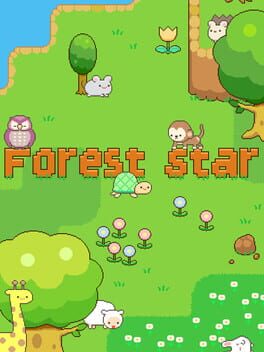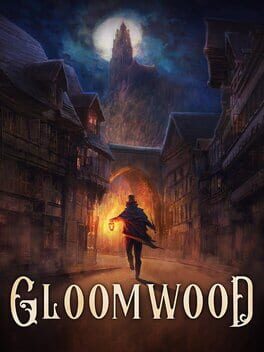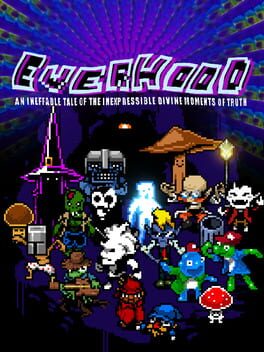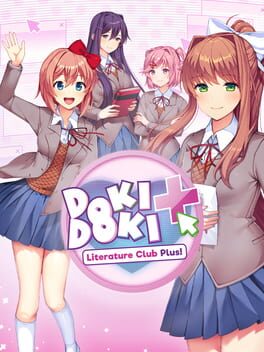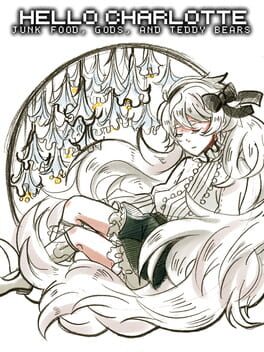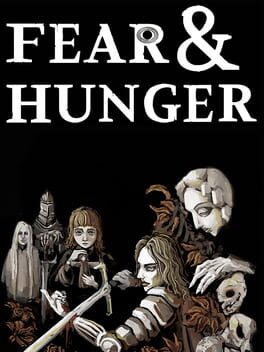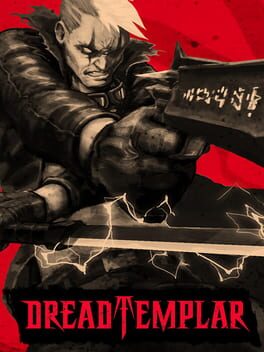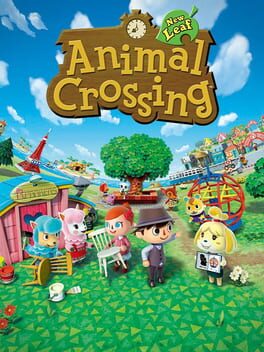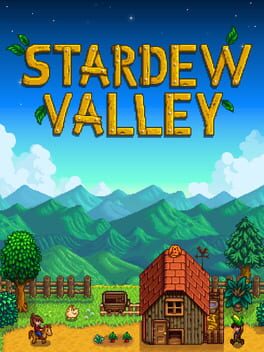efImmortal
2022
What really sells Chop Goblins is how much game-y it is. Pretty weird thing to say about something that doesn't try to experiment or present some unique with its gameplay at all. The only thing that could be said is that Chop Goblins features lack of jump button just like in first comers of the FPS-genre like original Wolfenstein and first Doom. In that sense, it's definitely retro besides the graphics.
This limitation for the player resulted in more grounded look towards the design of Chop Goblins. While the arenas themselves can't present a challenge for similar game with the ability to jump, here (it seems) player will have to think twice before moving forward. Carelesness is something that most modern shooters try to aboid by giving more options to escape, but this game goes the other direction and asks to just consider your movement.
Strictly speaking, shooters are always about navigation more than anything else. Even the act of shooting a target can't be done without putting your cursor on it. While movement shooters present an additional challenge with more options to navigate, it can be argued that they're temporarily break the 'shooter' gameplay for one moment and become only about 'movement'. Getting rid of options to move helps focus on combat more closely.
Obviously I'm not saying that movement shooters are bad in any way, I just wanted to point that out.
I care for this little silly game too much to admit. It's short and won't waste any of your time.
This limitation for the player resulted in more grounded look towards the design of Chop Goblins. While the arenas themselves can't present a challenge for similar game with the ability to jump, here (it seems) player will have to think twice before moving forward. Carelesness is something that most modern shooters try to aboid by giving more options to escape, but this game goes the other direction and asks to just consider your movement.
Strictly speaking, shooters are always about navigation more than anything else. Even the act of shooting a target can't be done without putting your cursor on it. While movement shooters present an additional challenge with more options to navigate, it can be argued that they're temporarily break the 'shooter' gameplay for one moment and become only about 'movement'. Getting rid of options to move helps focus on combat more closely.
Obviously I'm not saying that movement shooters are bad in any way, I just wanted to point that out.
I care for this little silly game too much to admit. It's short and won't waste any of your time.
2018
DUSK is very simple. Probably, that's one of the strongest sides of this game, considering there's nothing to stop you from just jumping in and starting a massacre. The gamefeel is one of those things you can't relay in a review, especially in the text form, but I think it's safe to say that most people (myself included) find the controls satisfying.
Another thing that draws in is the setting and directional choises. The game doesn't contain any cutscenes, it never asks you to take your fingers off keys. Everything that is shown you have to see for yourself. While the game looks downright ugly, it really captivates your attention with the ideas of levels themselves. Something that is very much enhanced by soundtrack. Sometimes DUSK feels like a game a kid with lots of imagination would make if they were given a sizable budget. And I don't mean it in a bad way, on a contrary, it feels like someone's dream come true.
However it does show that simplicity also one of the main downsides of DUSK. The game is so simple, you could call it primitive. Player has very standard set of guns and even more standard set of enemies that not vary throughout the whole game. Excluding only a couple of examples, most enemies are just the same basic concept put in different skins. They walk and shoot. Sometimes they shoot homing projectiles. Sometimes they shoot grenades. Maybe sometimes they fly. But they never show some complex behaviour. It becomes painfully obvious when you meet first few bosses - they're just the same enemy but with a huge healthbar on top. And if you might think that this would change later in game, I have sad news for you. Really, nothing changes in the way you play throughout DUSK. You don't learn any skills, none of the enemies really test them or push you to your limits. Because every enemy acts the same, you can't expect change in player's behaviour. To really understand why it's true just jump into endless mode for a couple of days, and see how long it takes before you stop having fun. DUSK is so simple, the gameplay feels solid and familiar. Something you already accustomed to and want more of. But if it weren't for presentational choices in the campain, this game easily might've been forgotten because of how shallow game design is.
While I enjoyed my time playing, I just can't be sure that it were enemies or arenas since first ones are uninspiring and second ones mostly serve to set the scene. That's why it should be said that most of the design choices left to be perfected. DUSK is more of a good David Szymansky game than it is a good shooter. Overall, it's okay.
Another thing that draws in is the setting and directional choises. The game doesn't contain any cutscenes, it never asks you to take your fingers off keys. Everything that is shown you have to see for yourself. While the game looks downright ugly, it really captivates your attention with the ideas of levels themselves. Something that is very much enhanced by soundtrack. Sometimes DUSK feels like a game a kid with lots of imagination would make if they were given a sizable budget. And I don't mean it in a bad way, on a contrary, it feels like someone's dream come true.
However it does show that simplicity also one of the main downsides of DUSK. The game is so simple, you could call it primitive. Player has very standard set of guns and even more standard set of enemies that not vary throughout the whole game. Excluding only a couple of examples, most enemies are just the same basic concept put in different skins. They walk and shoot. Sometimes they shoot homing projectiles. Sometimes they shoot grenades. Maybe sometimes they fly. But they never show some complex behaviour. It becomes painfully obvious when you meet first few bosses - they're just the same enemy but with a huge healthbar on top. And if you might think that this would change later in game, I have sad news for you. Really, nothing changes in the way you play throughout DUSK. You don't learn any skills, none of the enemies really test them or push you to your limits. Because every enemy acts the same, you can't expect change in player's behaviour. To really understand why it's true just jump into endless mode for a couple of days, and see how long it takes before you stop having fun. DUSK is so simple, the gameplay feels solid and familiar. Something you already accustomed to and want more of. But if it weren't for presentational choices in the campain, this game easily might've been forgotten because of how shallow game design is.
While I enjoyed my time playing, I just can't be sure that it were enemies or arenas since first ones are uninspiring and second ones mostly serve to set the scene. That's why it should be said that most of the design choices left to be perfected. DUSK is more of a good David Szymansky game than it is a good shooter. Overall, it's okay.
Not a game. It's Animal Crossing, but without many features that made this game 'it' besides the style. It's a designer application at this point. A good one, but still limited. As a designer myself, I could just model all this stuff in Blender for free. I don't see the reason to actually play New Horizons.
New Leaf lives forever in my heart.
New Leaf lives forever in my heart.
2021
2022
I try to get out of fishery. There's a guard behind a door. I drop a bottle to get his attention. Silence. I drop another bottle, a little closer than before. He won't come. I go to a door and open it. He is standing right before me, holding his gun to my head.
Cleared the whole building of huntsman. I mindlessly break window and see a note on a table. Started reading it. Halfway through the text I hear coughing voices. Two guys from the outsude heard glass breaking. They see me, and one of them has a gun. I have... a table.
I set one guard on fire, his burning corpse casted flames onto another one. He ran in panic and touched elbows with third one, burning him as well.
Great game. Let's see if it stays this way when it comes out of Early Access.
Cleared the whole building of huntsman. I mindlessly break window and see a note on a table. Started reading it. Halfway through the text I hear coughing voices. Two guys from the outsude heard glass breaking. They see me, and one of them has a gun. I have... a table.
I set one guard on fire, his burning corpse casted flames onto another one. He ran in panic and touched elbows with third one, burning him as well.
Great game. Let's see if it stays this way when it comes out of Early Access.
2020
This review contains spoilers
Firstly, OMORI makes you believe that something bad happened to Sunny - our main character. Then you get to know that his sister have died. Then you get to know that she probably commited suicide. THEN you get to know that Sunny actually killed his sister. And then he decides to tell his friends who, just as Sunny, were deeply traumatized by the event, the truth. What could be wrong? Okay, maybe it's just the simple little detail, that Sunny only decides to tell the truth after he got knocked out, and in his dream he heard that "his friends are good people, they will forgive him".
Oh yes, THEN he should probably apologize! Not because it's the right thing to do, it's because THEY are good people. THEY will forgive Sunny! So it's not about doing the right thing. It's about magic of friendship.
Most of people, who dislike the game for something, talk about writing structure and how it sucks - no pacing, too much fanservice. But there's more. Behind this colorful mess of forced gameplay, the story is about murderer and liar who never learned on his mistakes. Sunny killed his sister and lied to his friends. He abandoned Basil - the only friend who knows the truth and helped Sunny. Sunny doesn't even try to get his other friends back together - Kel is the one doing it. And then he confesses out of the blue because he believes he did nothing wrong. Don't you see how crazy it sounds? How is he a person I should care about and have sympathy for?
There is also an awful lot to unpack in terms of representing mental illness. Instead of telling you what to think, I just advise you to watch "Hello Future Me" essays on 'Writing Mental Illness' in fiction (https://www.youtube.com/watch?v=6c8o68ghGBM) and in videogames (https://www.youtube.com/watch?v=SQCb7GiNOrE). I'm sure, even if you don't agree with me that OMORI is a terrible game specifically because of how it handles topic of mental health, you could at least learn something.
OMORI is a mess, and Omocat manipulated people into loving it with her fractured expository writing.
Oh yes, THEN he should probably apologize! Not because it's the right thing to do, it's because THEY are good people. THEY will forgive Sunny! So it's not about doing the right thing. It's about magic of friendship.
Most of people, who dislike the game for something, talk about writing structure and how it sucks - no pacing, too much fanservice. But there's more. Behind this colorful mess of forced gameplay, the story is about murderer and liar who never learned on his mistakes. Sunny killed his sister and lied to his friends. He abandoned Basil - the only friend who knows the truth and helped Sunny. Sunny doesn't even try to get his other friends back together - Kel is the one doing it. And then he confesses out of the blue because he believes he did nothing wrong. Don't you see how crazy it sounds? How is he a person I should care about and have sympathy for?
There is also an awful lot to unpack in terms of representing mental illness. Instead of telling you what to think, I just advise you to watch "Hello Future Me" essays on 'Writing Mental Illness' in fiction (https://www.youtube.com/watch?v=6c8o68ghGBM) and in videogames (https://www.youtube.com/watch?v=SQCb7GiNOrE). I'm sure, even if you don't agree with me that OMORI is a terrible game specifically because of how it handles topic of mental health, you could at least learn something.
OMORI is a mess, and Omocat manipulated people into loving it with her fractured expository writing.
2021
The developers really want to impress players with visual style and funky music, and as I see from reviews here it works for most people. But I was bored to death with Everhood because I don't see what stands behind this colorful facade.
OoOoOOO Mistery! CaN yUo LerN Tha TRuTH?
Bruh I am a wooden doll and I just lost my arm, what are you even talking about?
I guess to learn that I have to complete the game! I like it when I play story-mode (because I don't care about the gameplay in Everhood) only to NOT get story for the whole duration of playing!
Everhood is mosly fights and fanservice. First ones are... unsatisfying? I mean, it tries to be a rhythm-game but it's not, since player is not prompted to follow the music. No, it's the enemies who attack you. Everhood is just a platformer at this point because all you do is jump. And your jumps don't have to be in a rhythm, there is no punishment if there is no synch. You just need to stay away from their attacks and that approach takes away from music being a game mechanic.
Just as A TON of others, I have a strong feeling that Everhood wants to be like Undertale. Look! We have deeper meening, but also a lot of goofy characters you have to talk to! And second one is kinda more important because we won't let you dive into the real story unless you are here to eat up all of the fanservice we give you! Delicious!
If all that is needed for the story to be successful these days is to be vague and have interesting visuals, it's pretty sad.
Everhood is not bad, it's just... tries to make itself look important way too hard. And I can't pretend like I care about it.
OoOoOOO Mistery! CaN yUo LerN Tha TRuTH?
Bruh I am a wooden doll and I just lost my arm, what are you even talking about?
I guess to learn that I have to complete the game! I like it when I play story-mode (because I don't care about the gameplay in Everhood) only to NOT get story for the whole duration of playing!
Everhood is mosly fights and fanservice. First ones are... unsatisfying? I mean, it tries to be a rhythm-game but it's not, since player is not prompted to follow the music. No, it's the enemies who attack you. Everhood is just a platformer at this point because all you do is jump. And your jumps don't have to be in a rhythm, there is no punishment if there is no synch. You just need to stay away from their attacks and that approach takes away from music being a game mechanic.
Just as A TON of others, I have a strong feeling that Everhood wants to be like Undertale. Look! We have deeper meening, but also a lot of goofy characters you have to talk to! And second one is kinda more important because we won't let you dive into the real story unless you are here to eat up all of the fanservice we give you! Delicious!
If all that is needed for the story to be successful these days is to be vague and have interesting visuals, it's pretty sad.
Everhood is not bad, it's just... tries to make itself look important way too hard. And I can't pretend like I care about it.
This review contains spoilers
When I first heard about Doki Doki I thought "Oh another one", meaning yet another game that looks innocent on the outside while being completely the opposite on the inside. A game with no more to it than that. Well, years later I finally gave in and tried it. Have to say, I am impressed. Yes, making readers realise that this innocence is only a seeming one is still the biggest 'selling' point of this novel, however the things that make it interesting are characters and literature. You see, I write myself. For fun. And I found many advices girls gave really useful for any aspiring author. It's nice to see the game about literature actually taking its subject seriously, so just for that Doki Doki Literature Club gets a huge plus from me (obviously there is a lot to literature, poems and storytelling to learn outside of that novel; still these advises are valuable). On top of this, visual novel really focuses on its characters, although I can only say that Sayori is the only one who I can call somewhat deep.
Player has very little agency over the course of full novel, and we don't really get to know all the girls personally, Sayori is the only one who really shares a lot of her real feelings beyond the point in the story where everything goes to hell. And it's a shame, I think there was a lot of care put into making reader believe that there is something to every character in the game, if you are willing to listen. I tried to romance Natsuki, the character that I dislike the most, and even after I made all poems for her, made every choice in her favor, nothing really changed about her. She is nothing more than tsundere that is being underappreciated. Also she has abusive father but we don't get to know it from her, we are just told that. Same goes for Yuri. Because your choices don't matter. The girl you are interested in doesn't have much to tell. And it leaves us with Monika.
Monika is supposed to be center of a story, character with its own mind, who gained control over this story and program itself. And she clearly has a goal - to be real. To connect with our reality. And to do that she enhances every other girl's negative traits, which means they are not crazy (at least THAT crazy) on their own. But why? What was her development and why she loves reader in the first place? Sadly, we don't get to know it. It's just a fact: she gained conciosness to break free from DDLC. I wish for more.
All in all, I think we had a decent title, with strong pros and equally as strong cons. On one hand we have work put into literature club itself: the poems are really entertaining and thoughtful, the advises about them help to shape understanding of creating something meaningful (also understanding criticism). But on the other hand we had lack of control over our choices and lack of character to anyone besides our childhood friend. Still, I think DDLC was visual novel that expressed feelings more than ideas, and this is what made it strong in my eyes.
Now, I say 'was', 'made' and etc. because in the PLUS version it all goes to hell. I like the original novel even with it's major issues because each poem gives you a deeper understanding of a character and because this game has interesting commentary on art and it rises interesting questions, such as: do you have to use metaphors in art or do you have to be literal to convey your thoughts? But DDLC Plus... I am not so sure what this is supposed to be.
For starters, let's say that I really like the idea of side stories about how friendship came to be. We get to know the origin of the club as well as how girls overcome their own problems to get to know each other a little bit better. However, it only ruins everything. How? Well, it all has to do with the base game - it remained untouched. And as one other review correctly pointed out, making all those flashbacks about friendship only makes Monika look demonic, since she is so open about her feelings from the moment the prequel story starts, and yet still betrays everyone for her own benefit in the main novel. She makes friends, tries to be better, tries to care but kills them in the end anyway. It's just hard to believe in this character after that. Hard to believe that she's real. Monika is too insane to even be called a program that gained consciosness because she does nonsensical things, and -if that's not true- we still don't get to know her reasoning behind her actions. I hoped that DDLC Plus! expands and adds content inside of the original story, but it doesn't. And it's sad.
The side-stories themselves are fine but... cringy? When you only start reading them they seem okay, but every one of them uses character's insecurities to drive the plot. These are teenage girls, they're awkward and shy, and they try to learn how to behave and read certain situations. Again, this is fine at the beginning, because we only got to know the characters, and on top of that you can relate to them a lot, because chances are you have been shy and awkward at least for some time in your life too. But when it's just the same formula applied over and over again though, it really starts to irritate me. It's just very boring to read. In my mind I had to turn on Dhar Mann voiceover to make it fun and enjoyable, because I get it! You read the situation wrong and gave wrong answer, said something that you shouldn't have said and now you are trying to make up for it. But you have shown this to me already! I get the point - it's important to talk about your feelings. And I appreciate this advice, it's cool. Just stop doing it over and over again and move onto some other subject. Please.
Also, This use of the caracter's flaw to create these small stories makes problems for the main game, because although it seems that every girl has come to realisation of what their problem is and they are trying to improve on it, in the main game they just forgot it! It's like it never happened in the first place.
And that brings me to the biggest problem I have with DDLC Plus. It's fake. You see, there is a feature in Plus, when you exit the novel, you are redirected to in-game Home Screen with different apps, one of which is email. And in one of emails you get there is a big reveal - Monika created a lot of versions of DDLC, a lot of "universes". As I understand it, side-stories are separate universe too. That's probably why original DDLC characters are disconnected from their stories in Plus, and that's why they don't remember how they fixed their relationships. And you know, I hate this trope. "It was all a dream". I hate this trope, because it takes away meaning from the story. Why events matter if they are fake anyway? Anything can be said and done, it doesn't matter. There is no meaning in the end because it's not the same universe and it never happened in whatever we are reading after that. It already was a big issue with core DDLC, where player's choices have no value because in the end we come to the same conclusion, but here it's worse - you can't even believe anything in the side-stories. Because this friendship is fake too, it has nothing to do with the original novel, and this point has a proof because developers directly gave it to us.
After this I just have no desire whatsoever to continue. I wish there would be a lot more inside of the main visual novel, like more choices, more meaningful conversations, but nothing changed there. In original DDLC we never get to know why Monika is the way she is, and I mean as character, as human being. From the perspective of someone with feelings and mind, why she does things in this cruel way? I believe that even if we don't get all the answers, we at least deserve to know her as someone more than very sad and lonely program. With DDLC Plus I have no idea if it is worth it to continue, because I might never find it out. Maybe I will get an email about that, but it's not a good way of storytelling. I want to hear it from Monika herself. To hear what feelings this character wants to share. The original novel is good exactly because of that - through their poems we actually get to know girls as people, as well as through their critique of each other. It is still a decent story, but what a shame it has to be just decent.
Player has very little agency over the course of full novel, and we don't really get to know all the girls personally, Sayori is the only one who really shares a lot of her real feelings beyond the point in the story where everything goes to hell. And it's a shame, I think there was a lot of care put into making reader believe that there is something to every character in the game, if you are willing to listen. I tried to romance Natsuki, the character that I dislike the most, and even after I made all poems for her, made every choice in her favor, nothing really changed about her. She is nothing more than tsundere that is being underappreciated. Also she has abusive father but we don't get to know it from her, we are just told that. Same goes for Yuri. Because your choices don't matter. The girl you are interested in doesn't have much to tell. And it leaves us with Monika.
Monika is supposed to be center of a story, character with its own mind, who gained control over this story and program itself. And she clearly has a goal - to be real. To connect with our reality. And to do that she enhances every other girl's negative traits, which means they are not crazy (at least THAT crazy) on their own. But why? What was her development and why she loves reader in the first place? Sadly, we don't get to know it. It's just a fact: she gained conciosness to break free from DDLC. I wish for more.
All in all, I think we had a decent title, with strong pros and equally as strong cons. On one hand we have work put into literature club itself: the poems are really entertaining and thoughtful, the advises about them help to shape understanding of creating something meaningful (also understanding criticism). But on the other hand we had lack of control over our choices and lack of character to anyone besides our childhood friend. Still, I think DDLC was visual novel that expressed feelings more than ideas, and this is what made it strong in my eyes.
Now, I say 'was', 'made' and etc. because in the PLUS version it all goes to hell. I like the original novel even with it's major issues because each poem gives you a deeper understanding of a character and because this game has interesting commentary on art and it rises interesting questions, such as: do you have to use metaphors in art or do you have to be literal to convey your thoughts? But DDLC Plus... I am not so sure what this is supposed to be.
For starters, let's say that I really like the idea of side stories about how friendship came to be. We get to know the origin of the club as well as how girls overcome their own problems to get to know each other a little bit better. However, it only ruins everything. How? Well, it all has to do with the base game - it remained untouched. And as one other review correctly pointed out, making all those flashbacks about friendship only makes Monika look demonic, since she is so open about her feelings from the moment the prequel story starts, and yet still betrays everyone for her own benefit in the main novel. She makes friends, tries to be better, tries to care but kills them in the end anyway. It's just hard to believe in this character after that. Hard to believe that she's real. Monika is too insane to even be called a program that gained consciosness because she does nonsensical things, and -if that's not true- we still don't get to know her reasoning behind her actions. I hoped that DDLC Plus! expands and adds content inside of the original story, but it doesn't. And it's sad.
The side-stories themselves are fine but... cringy? When you only start reading them they seem okay, but every one of them uses character's insecurities to drive the plot. These are teenage girls, they're awkward and shy, and they try to learn how to behave and read certain situations. Again, this is fine at the beginning, because we only got to know the characters, and on top of that you can relate to them a lot, because chances are you have been shy and awkward at least for some time in your life too. But when it's just the same formula applied over and over again though, it really starts to irritate me. It's just very boring to read. In my mind I had to turn on Dhar Mann voiceover to make it fun and enjoyable, because I get it! You read the situation wrong and gave wrong answer, said something that you shouldn't have said and now you are trying to make up for it. But you have shown this to me already! I get the point - it's important to talk about your feelings. And I appreciate this advice, it's cool. Just stop doing it over and over again and move onto some other subject. Please.
Also, This use of the caracter's flaw to create these small stories makes problems for the main game, because although it seems that every girl has come to realisation of what their problem is and they are trying to improve on it, in the main game they just forgot it! It's like it never happened in the first place.
And that brings me to the biggest problem I have with DDLC Plus. It's fake. You see, there is a feature in Plus, when you exit the novel, you are redirected to in-game Home Screen with different apps, one of which is email. And in one of emails you get there is a big reveal - Monika created a lot of versions of DDLC, a lot of "universes". As I understand it, side-stories are separate universe too. That's probably why original DDLC characters are disconnected from their stories in Plus, and that's why they don't remember how they fixed their relationships. And you know, I hate this trope. "It was all a dream". I hate this trope, because it takes away meaning from the story. Why events matter if they are fake anyway? Anything can be said and done, it doesn't matter. There is no meaning in the end because it's not the same universe and it never happened in whatever we are reading after that. It already was a big issue with core DDLC, where player's choices have no value because in the end we come to the same conclusion, but here it's worse - you can't even believe anything in the side-stories. Because this friendship is fake too, it has nothing to do with the original novel, and this point has a proof because developers directly gave it to us.
After this I just have no desire whatsoever to continue. I wish there would be a lot more inside of the main visual novel, like more choices, more meaningful conversations, but nothing changed there. In original DDLC we never get to know why Monika is the way she is, and I mean as character, as human being. From the perspective of someone with feelings and mind, why she does things in this cruel way? I believe that even if we don't get all the answers, we at least deserve to know her as someone more than very sad and lonely program. With DDLC Plus I have no idea if it is worth it to continue, because I might never find it out. Maybe I will get an email about that, but it's not a good way of storytelling. I want to hear it from Monika herself. To hear what feelings this character wants to share. The original novel is good exactly because of that - through their poems we actually get to know girls as people, as well as through their critique of each other. It is still a decent story, but what a shame it has to be just decent.
2015
2018
2017
2021
I don't really play FPS a lot, but I am interested in this genre. Dread Templar picked my interest, so I decided to give it a go. Movement feels good and responsive, guns shoot, music rocks, enemies slay and are being slayed too, retro-style graphics are stylish but detailed enough to contain more... details; power-ups are plenty but the currency you pay for installing those upgrades is not, which is a good thing - it makes you choose between preferred guns and therefore between playstyle. But that's pretty much it. Dread Templar has seeds of a good game scattered here and there, but they did not grow in some memorable and engaging mechanics.
The music is just there... it's not a bad music, it's just metal. Metal everywhere. Even when you're just walking with no one in sight. Feels goofy.
Save system is weird. I mean, where is autosave? I'm not against having an option to save in different slots but after two hours of playing I started question myself why would I need different slots anyway? It's not like if I find more secrets the ending would change, is it? And why do I need to press several buttons to save in the only slot I use? Too much work for something trivial. Also, sometimes (at least in the first chapters) these checkpoints at which you can save are close to each other which doesn't really makes sense. You can save here or 50 metres away, it won't really matter.
The enemies lack some sort of interactivity. Yes, they are different in their attacks, but all you can really do is shoot them. The only difference is target's size and (sometimes) speed. But it honestly looks uninspiring and feels boring to just walk and shoot. Would be cool if some enemies reacted to your arsenal differently depending on what guns you are choosing to use. Because for now it seems like you just need to use weapons that deal more damage. That is until you run out of bullets.
Also, explosions. I want to see their impact. But really you don't see the explosion itself, there is no immediate visual responce. Yes, enemies die around some radius, but it's not as satisfying when you actually see fire and smokes. Just a side note.
I refunded the game because my limited playtime wasn't promising. The only thing I hold against Dread Templar is lack of more nuanced directional and artistic approach. It's just a boring game. It's not that bad, but it also is far from good.
The music is just there... it's not a bad music, it's just metal. Metal everywhere. Even when you're just walking with no one in sight. Feels goofy.
Save system is weird. I mean, where is autosave? I'm not against having an option to save in different slots but after two hours of playing I started question myself why would I need different slots anyway? It's not like if I find more secrets the ending would change, is it? And why do I need to press several buttons to save in the only slot I use? Too much work for something trivial. Also, sometimes (at least in the first chapters) these checkpoints at which you can save are close to each other which doesn't really makes sense. You can save here or 50 metres away, it won't really matter.
The enemies lack some sort of interactivity. Yes, they are different in their attacks, but all you can really do is shoot them. The only difference is target's size and (sometimes) speed. But it honestly looks uninspiring and feels boring to just walk and shoot. Would be cool if some enemies reacted to your arsenal differently depending on what guns you are choosing to use. Because for now it seems like you just need to use weapons that deal more damage. That is until you run out of bullets.
Also, explosions. I want to see their impact. But really you don't see the explosion itself, there is no immediate visual responce. Yes, enemies die around some radius, but it's not as satisfying when you actually see fire and smokes. Just a side note.
I refunded the game because my limited playtime wasn't promising. The only thing I hold against Dread Templar is lack of more nuanced directional and artistic approach. It's just a boring game. It's not that bad, but it also is far from good.
2016
